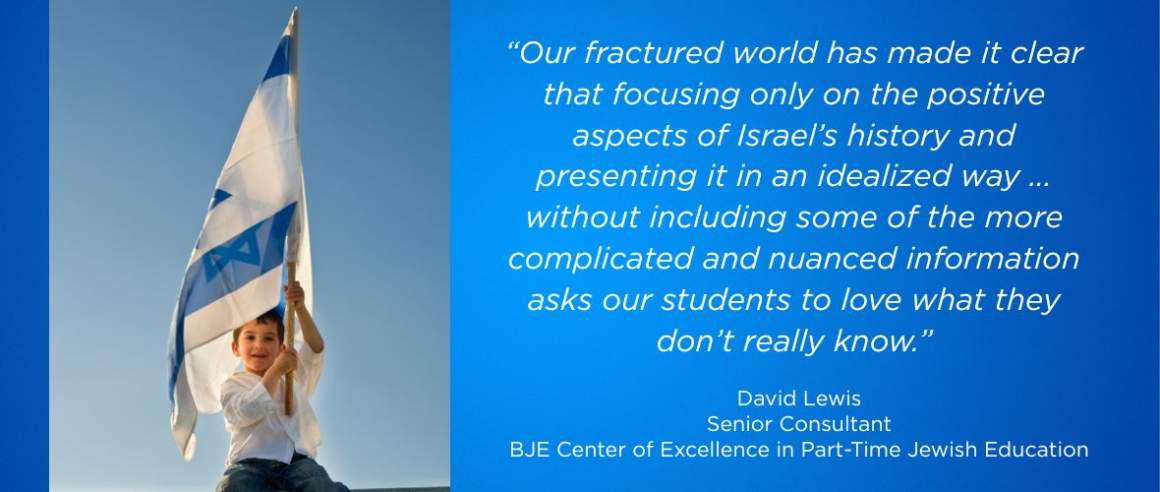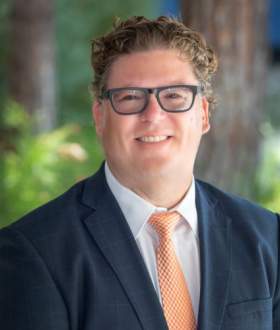
Our Religious Schools Need a New Israel Curriculum ASAP
By David Lewis
As we emerge from Pesach with Israel still in deep conflict and antisemitism continuing to spike globally, the American Jewish educational community finds itself at a crossroads. There is no doubt that religious schools (part-time Jewish education, primarily housed in synagogues) have a long history of championing Israel. However, the uncertain “Post October 7th” world in which we live has revealed that what our religious schools have been doing is no longer enough to prepare our children for the world they are entering, in which the subject of Israel is often challenged, divisive and hotly debated.
As the father of a freshman at University of Oregon, who visited several college campuses en route, I am among the many who have seen people challenging Israel directly in the face of Jewish students in “the quad,” in their classrooms, and in pamphlets shoved under their dorm room doors. It was during a few of these ‘campus moments’ that I came to realize that though my son (who has visited Israel twice and hangs an Israeli flag in his room), and so many of his friends and peers love Israel with a passion, it is simply not enough. The truth is that our students don’t know enough about Israel.
Their knowledge of Israel’s history, struggles, geography, and culture is woefully insufficient to engage in today’s Israel conversation that happens outside their schools and synagogues. Our fractured world has made it clear that focusing only on the positive aspects of Israel’s history and presenting it in an idealized way (marching around their social halls waving Israeli flags on Yom Ha’atzmaut and eating schnitzel) without including some of the more complicated and nuanced information asks our students to love what they don’t really know. And, when confronted about it, lacking a foundation of knowledge and facts about Israel, they retreat and focus on other ‘non-Jewish’ activities and pursuits on their college campuses. Schnitzel and hummus do not compel many of our college students to engage.
It is essential that our religious schools change this equation ASAP, as our elementary school aged students will be on college campuses in the blink of an eye. It is time we support our religious schools and their families with more than one-time programs on ‘preparing your Jewish child for college’ that have little long-term effect. We need students to grapple with the real Israel in a safe, knowledgeable, and supportive environment starting in their early elementary education, so that by the time they are B’nai Mitzvah, they have received a robust, in-depth, and rounded Israel education focused on knowing more—not just feeling more. Our religious schools need a new Israel curriculum ASAP, and BJE is leading our community in making it a reality.
Fortunately, a group of Los Angeles religious school/education directors realized this some time ago. In fact, six months prior to Oct. 7, 2023, members of BJE’s Reshet-LA: The Network for Innovation in Part-Time Jewish Education began the hard work that all agreed must be a priority. Starting in Fall 2023, eight BJE-affiliated religious school directors (from Temple Ramat Zion, Temple Isaiah, Adat Ari El, Hamakom, Kehillat Israel, Temple Menorah, Valley Beth Shalom, and Wilshire Blvd. Temple) enrolled in year of advanced study provided by BJE with Professor Sivan Zakai from HUC-JIR, a national expert on Israel education. The focus: to review best practices in the field, understand the emergent models in Israel education, and plot a course for a richer and deeper Jewish educational curriculum that builds on content year after year for all 48 religious schools across Los Angeles.
By the completion of the year of learning, the need was clear – while many and various Israel education materials and professional development opportunities exist for individual religious school directors, no comprehensive, multi-year, Israel curriculum exists specifically for religious school students. Israel curricula in our community’s religious schools tend to bring together disparate lessons with no curricular lynchpins. In ‘Hollywood’ terms, we provide our actors (i.e., teachers) with no scripts, and ask them to do improv for their audience (our students and their families). This is not a recipe for students to gain a solid knowledge of Israel before they enter the larger world of college and beyond, and developing such a curriculum is too much to ask of part-time teachers at each school.
Upon arriving at this ‘Aha Moment,’ BJE engaged two nationally respected and experienced curriculum writers and launched a program to develop a comprehensive 2nd-7th grade Israel curriculum that will be made available to ALL BJE religious schools, across denominations and across Los Angeles. Two additional schools (Temple Emanuel of Beverly Hills and Temple Akiba) have joined the eight schools mentioned above in this vital effort.
BJE is creating a robust and contemporary new Israel curriculum for our religious schools. The curriculum will include six lessons per year for ages 8 to 13 with the goal of all 48 BJE-affiliated religious schools having a ready-to-go script for these ages. As they are developed, the lessons will be piloted in our schools, tweaked as necessary, and then rolled out. To date, BJE has completed the first six lessons for grades 2-3. These lessons have been approved by a committee of curriculum experts and will be piloted in May 2025. By the end of 2025, a full bank of 18 lessons for students in grades 2 through 7 will be available to all BJE-affiliated religious schools.
This initiative is an essential but expensive endeavor. In addition to developing the curriculum, we need to train scores of L.A. religious school teachers to use it, create online platforms for teachers to access it, and create a reservoir of educational supports and tools. We know that for our children to become adults that know and love Israel, we need to make this investment to start changing the equation now!
BJE is grateful to the directors of our ten representative schools and the national experts for the time and wisdom they have dedicated to this vital project. We are also thankful to all those who donate to BJE and help us meet our community’s needs through their support.
Image


